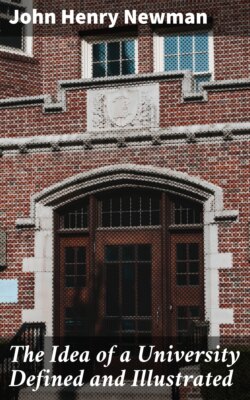Читать книгу The Idea of a University Defined and Illustrated - John Henry Newman - Страница 20
На сайте Литреса книга снята с продажи.
6.
ОглавлениеTable of Contents
Here, however, it may be objected to me that this representation is certainly extreme, for the school in question does, in fact, lay great stress on the evidence afforded by the creation, to the Being and Attributes of the Creator. I may be referred, for instance, to the words of one of the speakers on a memorable occasion. At the very time of laying the first stone of the University of London, I confess it, a learned person, since elevated to the Protestant See of Durham, which he still fills, opened the proceedings with prayer. He addressed the Deity, as the authoritative Report informs us, “the whole surrounding assembly standing uncovered in solemn silence.” “Thou,” he said, in the name of all present, “thou hast constructed the vast fabric of the universe in so wonderful a manner, so arranged its motions, and so formed its [pg 034] productions, that the contemplation and study of thy works exercise at once the mind in the pursuit of human science, and lead it onwards to Divine Truth.” Here is apparently a distinct recognition that there is such a thing as Truth in the province of Religion; and, did the passage stand by itself, and were it the only means we possessed of ascertaining the sentiments of the powerful body whom this distinguished person there represented, it would, as far as it goes, be satisfactory. I admit it; and I admit also the recognition of the Being and certain Attributes of the Deity, contained in the writings of the gifted person whom I have already quoted, whose genius, versatile and multiform as it is, in nothing has been so constant, as in its devotion to the advancement of knowledge, scientific and literary. He then certainly, in his “Discourse of the objects, advantages, and pleasures of science,” after variously illustrating what he terms its “gratifying treats,” crowns the catalogue with mention of “the highest of all our gratifications in the contemplation of science,” which he proceeds to explain thus:
“We are raised by them,” says he, “to an understanding of the infinite wisdom and goodness which the Creator has displayed in all His works. Not a step can be taken in any direction,” he continues, “without perceiving the most extraordinary traces of design; and the skill, every where conspicuous, is calculated in so vast a proportion of instances to promote the happiness of living creatures, and especially of ourselves, that we can feel no hesitation in concluding, that, if we knew the whole scheme of Providence, every part would be in harmony with a plan of absolute benevolence. Independent, however, of this most consoling inference, the delight is inexpressible, of being able to follow, as it were, with our eyes, the marvellous [pg 035] works of the Great Architect of Nature, to trace the unbounded power and exquisite skill which are exhibited in the most minute, as well as the mightiest parts of His system. The pleasure derived from this study is unceasing, and so various, that it never tires the appetite. But it is unlike the low gratifications of sense in another respect: it elevates and refines our nature, while those hurt the health, debase the understanding, and corrupt the feelings; it teaches us to look upon all earthly objects as insignificant and below our notice, except the pursuit of knowledge and the cultivation of virtue, that is to say, the strict performance of our duty in every relation of society; and it gives a dignity and importance to the enjoyment of life, which the frivolous and the grovelling cannot even comprehend.”
Such are the words of this prominent champion of Mixed Education. If logical inference be, as it undoubtedly is, an instrument of truth, surely, it may be answered to me, in admitting the possibility of inferring the Divine Being and Attributes from the phenomena of nature, he distinctly admits a basis of truth for the doctrines of Religion.
